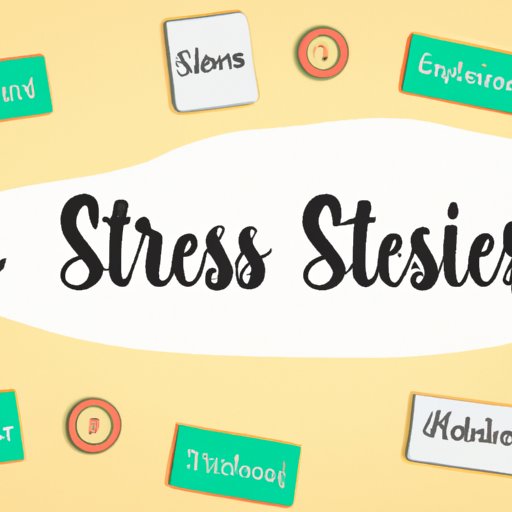Introduction
Stress is a natural part of life. It’s our body’s way of responding to a perceived threat or challenge, whether it’s a big presentation at work or a bear in the woods. But when stress becomes chronic, it can take a serious toll on our physical and mental health. This article will explore the science of stress and how it affects the body. We’ll also look at the link between stress and chronic pain, sleep, and mental health, and provide tips for managing stress to improve overall health and well-being.
The Science of Stress: Understanding How it Affects Your Body
Stress triggers a complex series of physiological reactions in the body. When you experience stress, your body releases a cascade of hormones and neurotransmitters that prepare you to respond to a threat. This is known as the fight or flight response. Your heart rate increases, your blood pressure rises, and your muscles tense up. Your body is gearing up to either face the threat head-on or run away from it.
This response is controlled by your nervous system, specifically the sympathetic nervous system. The sympathetic nervous system is responsible for the fight or flight response, while the parasympathetic nervous system is responsible for the rest and digest response, which helps your body recover after the stressor has passed.
From Headaches to Heart Attacks: The Physical Toll of Stress on the Body
Chronic stress can have serious physical consequences, both in the short term and the long term. In the short term, stress can cause headaches, gastrointestinal distress, and muscle tension. But over time, chronic stress can increase your risk of developing more serious health problems, including cardiovascular disease, diabetes, and autoimmune disorders.
Stress has a particularly strong link to cardiovascular health. When your body is in a state of chronic stress, your heart has to work harder to pump blood throughout your body. Over time, this can lead to high blood pressure, which can increase your risk of heart attack and stroke.
Stress can also trigger headaches, particularly tension headaches. Tension headaches are caused by tightness in the muscles of the scalp and neck. When you’re stressed, your muscles tend to tense up, which can lead to tension headaches.
Cortisol, Adrenaline, and More: Exploring the Hormonal Response to Stress
In addition to the fight or flight response, stress triggers a hormonal response in the body. When you’re stressed, your body releases a hormone called cortisol. Cortisol plays an important role in helping your body manage stress, but when cortisol levels are constantly elevated due to chronic stress, it can have negative effects on your health.
Chronic stress can also lead to an overactive adrenal gland, which produces too much adrenaline. Adrenaline is another hormone that plays a role in the fight or flight response. When adrenaline levels are too high, it can cause symptoms like chest pain, rapid heartbeat, and muscle tremors.
Stress and Your Immune System: How Chronic Stress Can Affect Your Health
Your immune system is closely linked to your stress response. When you’re stressed, your body releases cytokines, which are small proteins that play a role in immune system function. In small doses, cytokines help your body fight off infection and heal from injuries. But when cytokine levels are constantly elevated due to chronic stress, it can weaken your immune system, making you more susceptible to illness and disease.
Chronic stress has also been linked to the development of autoimmune disorders, in which the body’s immune system mistakenly attacks its own tissue. These conditions can be incredibly challenging to manage, and often require ongoing medical treatment.
The Link Between Stress and Chronic Pain: How to Break the Cycle
Chronic pain and stress often go hand in hand. When you’re in pain, it can be hard to relax, which can lead to increased stress levels. And when you’re stressed, it can make your pain feel even worse. It’s a vicious cycle.
One of the most effective ways to manage stress-induced pain is through relaxation techniques like deep breathing, yoga, or meditation. These practices can help reduce muscle tension and promote feelings of relaxation, which can help alleviate pain symptoms.
Stress and Sleep: How Stress Interrupts Your Zzz’s and What to Do About it
Stress can have a major impact on your sleep quality. When you’re stressed, it can be hard to fall asleep or stay asleep throughout the night. This can leave you feeling tired and irritable during the day, which can, in turn, increase your stress levels.
To improve your sleep hygiene, try implementing a relaxing bedtime routine. This might include taking a warm bath, reading a book, or practicing relaxation techniques like deep breathing. It’s also important to create a relaxing sleep environment by keeping your bedroom cool, dark, and quiet.
Mental Health Matters: The Connection Between Stress and Anxiety or Depression
Stress can also have a serious impact on mental health. When you’re stressed, it can trigger symptoms of anxiety or depression. This might include feelings of sadness, hopelessness, or worthlessness.
If you’re experiencing symptoms of anxiety or depression, it’s important to seek professional help. This might include therapy, medication, or a combination of both. It’s also important to practice stress management techniques to help reduce your overall stress levels.
Conclusion
Stress is a natural part of life, but chronic stress can take a serious toll on your physical and mental health. By understanding the science of stress and its effects on the body, you can take steps to manage your stress levels and improve overall health and well-being. From relaxation techniques to sleep hygiene, there are many strategies you can use to help reduce stress and feel your best. Don’t let stress take control of your life—take control of your stress today.
